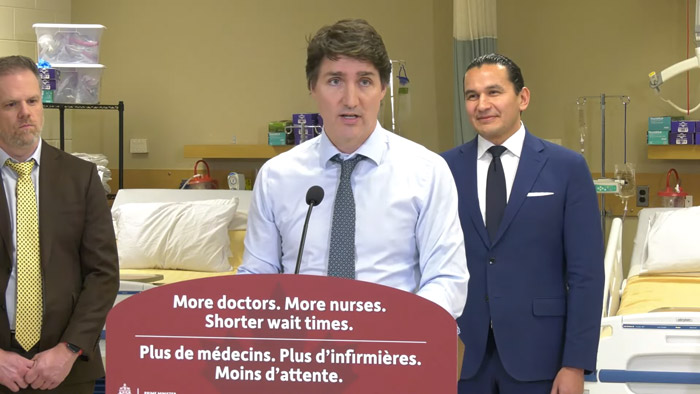Together, the governments of Canada and Manitoba are working to bring more health-care workers to the front lines, reducing wait times and delivering the best possible care to Manitobans.
Prime Minister Justin Trudeau, alongside Manitoba Premier Wab Kinew, recently announced more than $633 million in funding to improve health care in Manitoba. Through the Working Together agreement, the Government of Canada will provide close to $434 million to support Manitoba’s three-year action plan to improve health care, and approximately $199 million through the Aging with Dignity agreement to support their five-year action plan to improve home, community and long-term care for seniors.
“Canadians value universal public health care. That’s why we’re signing agreements with provinces and territories to make health care work better for Canadians,” said Prime Minister Justin Trudeau. “Today’s agreements with Manitoba will help hire more health workers, reduce wait times, support seniors and make sure Canadians get the care they need, when they need it.”
Under the Working Together agreement, Manitoba will move forward with its commitments to fix the damage done to health care, starting with staffing shortages. The funding will support Manitoba’s goal to hire 400 more doctors, 300 more nurses, 200 paramedics and 100 home care workers. These targeted investments will help to add more acute and medicine beds to Manitoba’s health-care system, ease the pressure on crowded emergency rooms and expand primary care options to families so they can spend more time doing what they love to do and less time waiting for care.
Together, Canada and Manitoba are working to remove barriers for internationally trained doctors and health professionals to practise in Manitoba. This includes removing barriers to foreign credential recognition, simplifying licensing processes and increasing program access to educated and skilled health professionals. Manitoba will make it easier for health workers to move within Canada so they spend less time dealing with red tape and more time helping patients in need.
Manitoba will hire more psychologists to help reduce wait times for counselling and double hospital spaces for those experiencing homelessness and needing comprehensive health care and treatment. Additionally, the province will support addictions treatment services, peer support and other community-based mental health initiatives.
“Fixing the health-care staffing shortage is job number one for our government – that means more support for the bedside instead of the bureaucracy,” said Premier Wab Kinew. “We will work with the Government of Canada to hire more doctors and more nurses into our system, so we can start to cut wait times and deliver the best care possible for Manitobans.”
Through the Aging with Dignity agreement, Manitoba will ensure all seniors are able to age with dignity and respect. The province will better support seniors who want to age at home, in community or in personal care homes. To improve the quality of long-term care, the province will increase safety and standards and hire more long-term care workers to ensure clean, quality and personalized care. Manitoba will also create a seniors advocate to act as an independent, strong voice for seniors and their families.
The federal and provincial governments will engage and work with Indigenous Peoples to address gaps and systemic inequities in Indigenous health-care services and improve access to culturally safe care. Under the agreement, funds will support Indigenous families through Granny’s House, a project that provides culturally safe and community-led care to children and families. Funding will also support Indigenous-led treatment programs that provide culturally safe and relationship-based individualized care for youth. As we move forward on the shared path of reconciliation, safe and timely health care is a priority for Indigenous communities.
This investment is part of the government of Canada’s larger work to invest over $200 billion to improve health care including through tailored bilateral agreements with provinces and territories as well as $5.4 billion for Aging with Dignity agreements. Through the agreements announced today, the governments of Canada and Manitoba will deliver better results for patients, support health workers, and protect our health-care system now and into the future.





